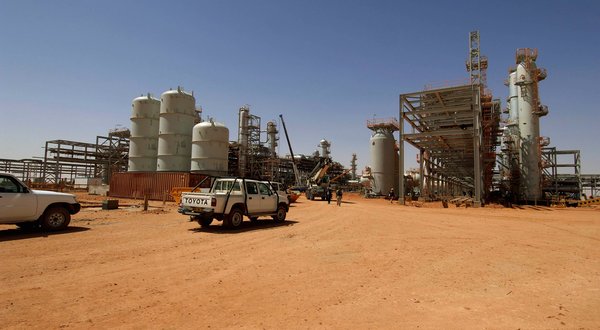Militants
Seize Americans and Other Hostages in Algeria

An undated photo of the In Amenas gas field in Algeria, where Islamist militants took at least 20 foreign hostages on Wednesday.
By ADAM NOSSITER and SCOTT SAYARE
Published: January 16, 2013
BAMAKO, Mali — The French military assault on Islamist extremists in Mali escalated into a potentially much broader North African conflict on Wednesday when, in retribution, armed attackers in unmarked trucks seized an internationally managed natural gas field in neighboring Algeria and took at least 20 foreign hostages, including Americans.
Algerian officials said at least two people, including a Briton, were killed in the assault, which began with a predawn ambush on a bus trying to ferry gas-field workers to an airport. Hundreds of Algerian security forces were sent to surround the gas-field compound, creating a tense standoff, and the country’s interior minister said there would be no negotiations.
Algeria’s official news agency said at least 20 fighters had carried out the attack and mass abduction. There were unconfirmed reports late on Wednesday that the security forces had tried to storm the compound and had retreated under gunfire from the hostage takers.
Many details of the assault on the gas field in a barren desert site near Libya’s border remained murky, including the precise number of hostages, which could be as high as 41, according to claims by the attackers quoted by regional news agencies. American, French, British, Japanese and Norwegian citizens who worked at the field were known to be among them, officials said.
Defense Secretary Leon E. Panetta called the gas-field attack a terrorist act and said the United States was weighing a response. His statement suggested that the Obama administration could be drawn into a military entanglement in North Africa that it had been seeking to keep at arm’s length — even as it has conceded that the region has become a new haven for extremists who threaten Western security and vital interests.
“I want to assure the American people that the United States will take all necessary and proper steps that are required to deal with this situation,” Mr. Panetta said during a visit to Italy.
The gas-field attack, which seemed to take foreign governments and the British and Norwegian companies that help run the facility completely by surprise, appeared to make good on a pledge by the Islamist militants who seized northern Mali last year to sharply expand their struggle against the West in response to France’s military intervention that began last week.
The hostage taking potentially broadened the conflict beyond Mali’s borders and raised the possibility of drawing an increasing number of foreign countries into direct involvement, particularly if expatriates working in the vast energy extraction industries of North Africa become targets. It also doubled, at least, the number of non-African hostages that Islamist militants in northern and western Africa have been using as bargaining chips to finance themselves in recent years through ransoms that have totaled millions of dollars.
But there was no indication that the gas-field attackers wanted money, and no other demands or ultimatums were issued. In a statement sent to ANI, a Mauritanian news agency, they demanded the “immediate halt of the aggression against our own in Mali.”
The statement, made by a group called Al Mulathameen, which has links to Al Qaeda in the Islamic Maghreb, the North African affiliate of Al Qaeda, claimed it was holding more than 40 “crusaders” — apparently a reference to non-Muslims — “including seven Americans, two French, two British as well as other citizens of various European nationalities.”
Algeria’s interior minister, Daho Ould Kablia, said, according to Reuters, that the raid was led by Mokhtar Belmokhtar, who fought Soviet forces in Afghanistan in the 1980s and recently set up his own group in the Sahara after falling out with other local Qaeda leaders.
Mr. Belmokhtar is known to French intelligence officials as “the Uncatchable” and to some locals as “Mister Marlboro” for his illicit cigarette-running business, the news agency said. His ties to Islamist extremists who seized towns across northern Mali last year are unclear.
The gas-field attack coincided with an escalation of the fight inside Mali, according to Western and Malian officials, as French ground troops, joined by soldiers of the Malian Army, engaged in combat with Islamist fighters. The officials said the French-Malian units had begun to beat back the Islamist militant advance southward from northern Mali, a move that had provoked the intervention ordered by President François Hollande of France.